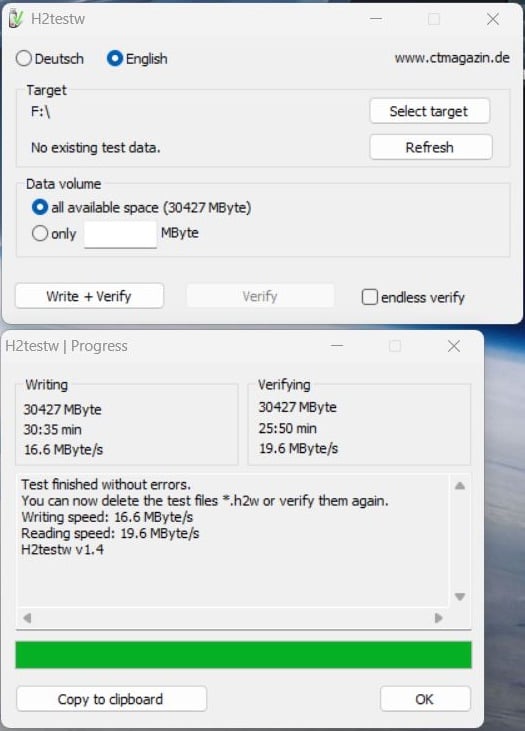New
#1
MicroSD Card keeps partially overwriting existing files despite chkdsk
I have a 400 GB SanDisk Micro SD Card that I use with my Android phone.
Well, actually it's my second one, I have two now.
Each has lasted about 2 years before developing a strange defect, wherein
1) new files transferred to the phone from my PC (usually via USB connection)
2) photos shot with the phone in "quick" succession (1 - 3 seconds apart) as well as recorded videos
...would sometimes have some of those files or photos/videos becorrupted.* Not all of them, not all the time, but often enough.
This was annoying, but manageable just double-check new photos/videos and newly transferred files to see if any of them are broken and replace them.
When this happened with my first 400 GB SanDisk, I replaced it with a second 400 GB SanDisk.
That second card developed the same flaw after another 2 years but now, after ~2.5 years, it's gotten worse.
Now, not only do new files sometimes getcorrupteddamaged, but OLD files that had previously been functional get damaged when I transfer new files to the phone.
Basically, every time I copy a larger amount of new files to the card, I'm playing Russian roulette with the data that is already on it.
I've tried chkdsk.
This has yielded logs like this (heavily abbreviated, these logs can be 600+ lines long):
chkdsk T: /f
The type of the file system is exFAT.
Cannot lock current drive.
Chkdsk cannot run because the volume is in use by another
process. Chkdsk may run if this volume is dismounted first.
ALL OPENED HANDLES TO THIS VOLUME WOULD THEN BE INVALID.
Would you like to force a dismount on this volume? (Y/N) y
Volume dismounted. All opened handles to this volume are now invalid.
Volume Serial Number is [REDACTED]
Windows is verifying files and folders...
Cleaning up minor inconsistencies on the drive.
Corruption was found while examining files in directory \WhatsApp\Media\WhatsApp Video\ (98).
Cleaning up minor inconsistencies on the drive.
Corruption was found while examining files in directory \WhatsApp\Media\WhatsApp Audio\ (6).
Cleaning up minor inconsistencies on the drive.
Corruption was found while examining files in directory \Sounds\ (568).
Cleaning up minor inconsistencies on the drive.
Corruption was found while examining files in directory \Sounds\ (969).
Cleaning up minor inconsistencies on the drive.
Corruption was found while examining files in directory \Sounds\ (1758).
[...]
Corruption was found while examining files in directory \-DATA2\-TEXT\ (7777).
Corruption was found while examining files in directory \-DATA2\-TEXT\ (7781).
Corruption was found while examining files in directory \-DATA2\-TEXT\ (7783).
// There was, like, 100+ such messages in just that directory alone
[...]
Corruption was found while examining files in directory \-DATA2\-TEXT\ (8188).
Corruption was found while examining files in directory \-DATA2\-TEXT\ (8191).
Corruption was found while examining files and directories.
Corruption was found while examining the volume bitmap. // This seems relevant.
Windows is verifying file allocations...
\WhatsApp\Media\WhatsApp Documents\Sent\NEW TEXT-1.pdf is cross-linked on allocation unit 490386.
Cross link resolved by copying.
\Sounds\.vtdata\20211025_191634_text is cross-linked on allocation unit 1416990. // This too seems relevant.
Cross link resolved by copying.
\Sounds\.vtdata\20230227_162641_text is cross-linked on allocation unit 708206.
Cross link resolved by copying.
\Sounds\.vtdata\20230711_020018_text is cross-linked on allocation unit 559721.
Cross link resolved by copying.
[...]
\Sounds\.backup\[some long folder name] is cross-linked on allocation unit 754076.
Cross link resolved by copying.
\Pictures\Screenshots\Screenshot_20220723-142416.jpg is cross-linked on allocation unit 755958.
Insufficient disk space to copy cross-linked portion.
File being truncated. // That's a bit odd, there's at least 20+ GB left on the card, and the screenshot in question is 359 kb, it shouldn't trigger such a message.
\DCIM\Camera\IMG_20240306_155202.jpg is cross-linked on allocation unit 489902.
Cross link resolved by copying.
\DCIM\Camera\IMG_20240316_041925.jpg is cross-linked on allocation unit 488526.
Cross link resolved by copying.
\DCIM\Camera\IMG_20230718_043604.jpg is cross-linked on allocation unit 724605.
Cross link resolved by copying.
\DCIM\Camera\IMG_20230818_045200.jpg is cross-linked on allocation unit 724565.
Cross link resolved by copying.
\DCIM\Camera\VID_20240121_143541.mp4 is cross-linked on allocation unit 1409506.
Cross link resolved by copying.
\DCIM\Camera\IMG_20240121_143603.jpg is cross-linked on allocation unit 1409450.
Cross link resolved by copying.
\DCIM\Camera\VID_20240121_143646.mp4 is cross-linked on allocation unit 1410341.
Cross link resolved by copying.
\DCIM\Camera\IMG_20240219_012146.jpg is cross-linked on allocation unit 684717.
Cross link resolved by copying.
\DCIM\Camera\IMG_20240221_225151.jpg is cross-linked on allocation unit 559734.
Cross link resolved by copying.
\Android\data\com.google.android.apps.books\[some long folder name] is cross-linked on allocation unit 1064576.
Cross link resolved by copying.
[...] [...] [...]
\-DATA\-AUDIO\BOOKMARKS\bookmarks_28.06.23.mpb is cross-linked on allocation unit 752790.
Cross link resolved by copying.
File and folder verification is complete.
Windows has made corrections to the file system.
No further action is required.
384573440 KB total disk space.
363220736 KB in 91625 files.
460032 KB in 1777 indexes.
0 KB in bad sectors.
512 KB in use by the system.
20892160 KB available on disk.
262144 bytes in each allocation unit.
1502240 total allocation units on disk.
81610 allocation units available on disk.
From what I understand, the MicroSD card can't figure out that data is already present in that "unit" and it overwrites it to store new files, thus breaking the old files.
I've run chkdsk multiple times. Sometimes chkdsk will claim to have successfully repaired all errors, only to find more errors when I run it a second time immediately afterwards.
The problem persists.
Before I go out there and buy a new 400 GB Micro SD card, I'd like to ask the experts if this is somehow a "fixable" problem.
I know how hard drive defragmentation works; I know that a single large file isn't necessarily stored continuously in one location on the disk, but instead split into many pieces spread out across many sectors whereever there happens to be space available at the time.
I imagine something similar happens with files on a Micro SD card; and in the case of my particular Micro SD card(s) it can't seem to figure out which sectors are already in use and which are not, so it'll sometimes randomly overwrite data it shouldn't have.
What confuses me greatly is... well... how does that even happen???? Like, the "lookup table" of available sectors is broken or something? Except, right up to the point a file gets partially overwritten by new data, that file had remained perfectly readable. So... if the "lookup table" had been damaged, wouldn't that file have already been unreadable before?
And "intuitively", this seems like a problem that ought to be fixable somehow. Like, it's not like there are "physically damaged sectors" on the MicroSD card just that the MicroSD card makes "strange decisions" about where to write new data.
Heck, I can even tell that the problem is "spreading outwards" groups of pictures copied to the phone at the same time that initially only had 1 or 2corrupteddamaged images now have more
Also, since both SanDisk cards purchased 2 years apart had the same defect, I'm guessing SanDisk isn't... known for the quality of its products. Any suggestions on a cheap 400 GB Micro SD card from a better manufacturer?
Last edited by HedgeToaster; 1 Week Ago at 14:57.



 Quote
Quote




